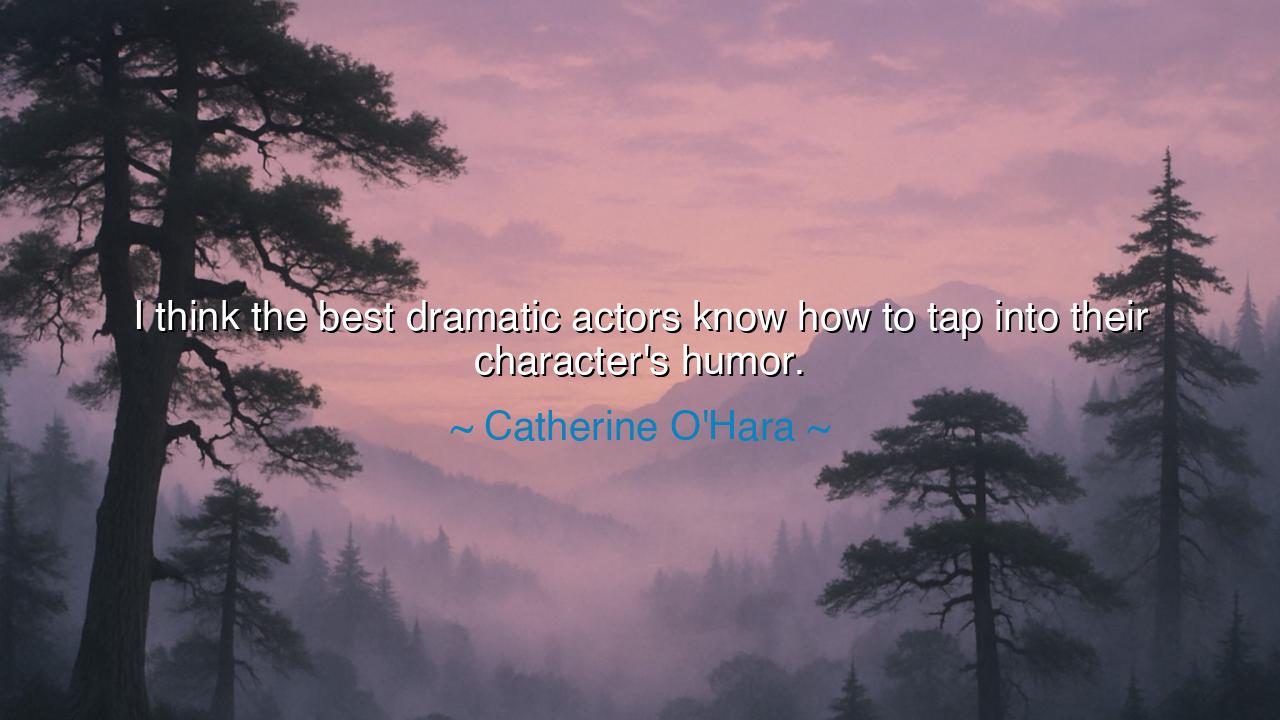
I think the best dramatic actors know how to tap into their






In the ancient traditions of storytelling and performance, there is a profound understanding that the soul of the actor is not just bound by the script, but by the depths of the character they portray. The great Catherine O'Hara imparts a timeless truth when she says, "I think the best dramatic actors know how to tap into their character's humor." What O'Hara is speaking to is the sacred art of transformation—the ability to become not just a vessel for words, but for the very spirit of a character. It is an act of alchemy, where the actor draws from the well of their own humanity and brings forth the essence of their character, finding even in the darkest of moments the spark of humor that lies within.
Humor, as O'Hara suggests, is not merely a comedic device; it is an essential part of the human condition. The ancients knew that to understand the nature of a person, one must understand their joy as well as their suffering. Sophocles, the great playwright of ancient Greece, often wove elements of humor into his tragedies, recognizing that the tragic and the comic are not opposites but parts of a whole. In his masterpiece Oedipus Rex, while the tale unfolds in the shadow of fate and hubris, there are moments when the tragic hero’s arrogance is exposed in ways that are almost humorous. This duality—where humor rises from the depths of tragedy—is a key to understanding the full complexity of the human spirit.
In Shakespeare, too, we find this delicate balance between humor and drama. The great playwright often infused his most serious works with wit and irony, recognizing that the human soul cannot be understood in black and white terms alone. In Hamlet, for example, the eponymous hero is mired in existential despair, yet he uses wit and dark humor as a way to cope with his inner turmoil. Polonius, though a fool, is the source of some of the play’s sharpest comedic moments. Shakespeare’s mastery lies in his ability to show that even in the midst of great drama, humor exists as an inherent part of the experience of living, revealing the fragility of human nature and the absurdities that often define it.
The wisdom of O'Hara echoes through the ages, as she suggests that the best actors are those who are able to tap into that humor, that elusive spark within their characters, even in the most serious of roles. To be a truly great actor is to be able to navigate this delicate terrain—finding the layers of lightness even within the darkest of characters. The ancient comedian often used humor not just for entertainment, but as a way to expose the truths of society, the flaws of the powerful, and the complexities of the human condition. Aristophanes, the master of ancient Greek comedy, was a prime example of this. His plays, such as Lysistrata and The Clouds, were not simply intended to entertain—they were powerful tools for social critique, exposing the absurdities of war, politics, and society through humor. Aristophanes knew that humor, when woven into the fabric of drama, could be a force that both enlightens and entertains.
In our modern age, O'Hara's words carry a similar weight. She calls upon us to recognize that in the dramatic arts, the actor must engage with all facets of their character—humor, pain, joy, and conflict—to bring forth a truly authentic performance. It is through the ability to find and portray humor in even the most tragic circumstances that an actor can reveal the full spectrum of their character’s humanity. Think, for example, of the great actor Robin Williams, whose performances often walked the line between comedy and tragedy. In films like Dead Poets Society and Good Will Hunting, Williams used his humor not merely as a form of entertainment but as a means to connect with the deeper struggles of his characters. His ability to tap into both the light and dark aspects of his roles made him one of the most beloved and powerful actors of his generation.
The lesson to be learned here is that humor is not merely an instrument of laughter, but a key to understanding the soul. Whether on the stage or in life, humor allows us to see beyond the surface and find the truth hidden beneath. O'Hara invites us to recognize that to truly understand the depth of a character, or of a person, we must acknowledge both their joy and their suffering. The greatest actors, like the greatest people, are those who can find humor in the face of adversity, and who can use it to connect, to heal, and to reveal the full complexity of human existence.
In our own lives, let us remember the power of humor. Let us not take ourselves too seriously, but also recognize the depth of the moments when we can find lightness even in the most challenging of times. Let us tap into the humor within ourselves and others, for it is in this humor that we often find the truths that we may otherwise overlook. Let humor guide us, not as a means of avoiding life’s challenges, but as a means of navigating them with grace, wisdom, and an open heart. And, like the greatest actors, may we learn to tap into the humor of our own characters, embracing the full spectrum of the human condition.






AAdministratorAdministrator
Welcome, honored guests. Please leave a comment, we will respond soon